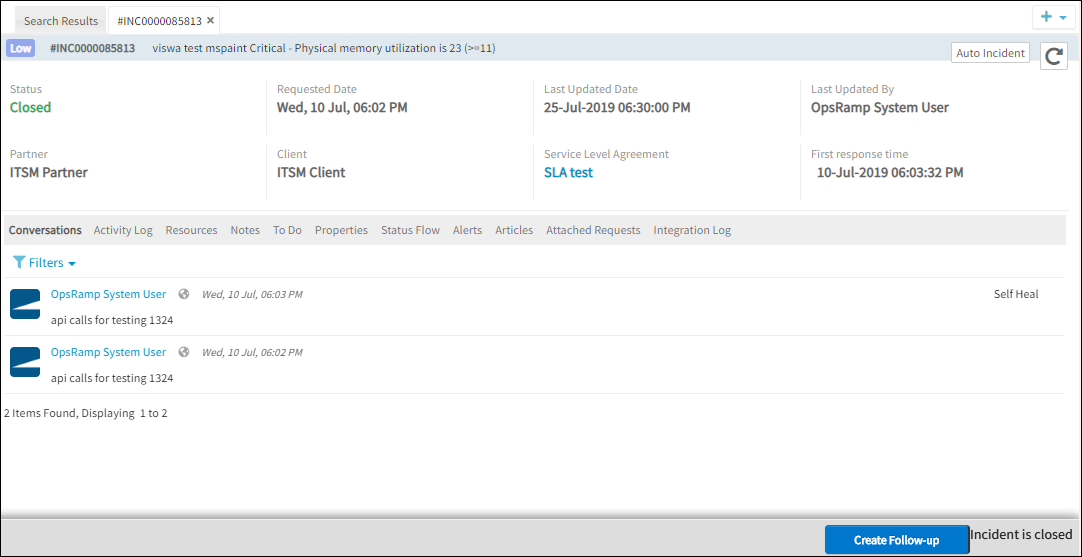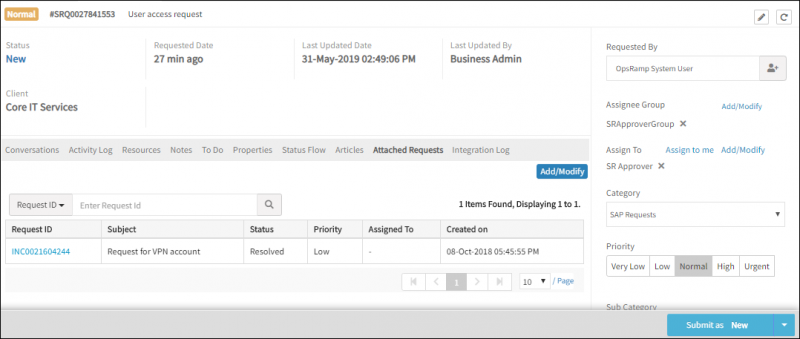Introduction
Service Request is a standard request that has already been pre-approved in an organization.
- Service Request is created when user needs information, advice, or access to services.
- Creating a list of pre-approved service requests reduces approval workflow cycles.
Example:
- User authentication request
- Renewal of expired certificate of a website
- Password change
Configuring service request settings
Customize Service Request details by creating custom fields in addition to the predefined fields.
To configure Service Request settings:
- From All Clients, select the client.
- Go to Setup > Service Desk > Configuration section > Settings.
- Click Service Request, configure the settings, and click Update.
Creating service requests
Service requests can be created using:
- Service Desk
Creating service requests on Service Desk
To create a new Service Request on Service Desk:
- From the options in the drop-down menu, click Service Desk.
- Click New and then click Service Request. The New Service Request page is displayed.
- In the New Service Request page, provide the required details and click Create.
Supported fields
| Field name | Description |
|---|---|
| Partner Name | Select the partner. |
| Client Name | Select the client. |
| Subject | Title or short summary of Service Request |
| Description | The information required to describe Service Request scenario. This can include the actual behavior, expected behavior, and steps to reproduce the issue. |
| Attach file | The artifacts required to support Service Request. Example: error messages, screenshots, excerpts from log files. Supported file types: `.txt`, `.jpg`, `.zip`, `.docx`, `.odt`, `.odg` and `.xlsx`. File size limit: 32 MB |
| Requested By | User who requests service. |
| Assignee Group | User group that manages Service Request. |
| Assign to | User who acts on Service Request. |
| Resources | Devices on which the Service Request is identified. |
| Category | Category to which the Service Request is mapped. |
| Sub Category | Subcategory under the category to which the Service Request is mapped. |
| Priority | Measure of how soon the Service Request needs to be resolved. |
| Cc | Email addresses of the users who need to be copied in the email notification. |
| Attach Incidents | Any incidents that can be cited as a reason for the creation of Service Request. |
| Articles | KB articles that help in the resolution of Service Request. |
Creating service requests through email
To install a new email integration:
- Go to Setup > Integrations > Integrations.
- In the Available Integrations, Click Email Requests.
- In the Install Email Requests Integrations page, provide a Name of the Integration.
- Select the Request Type as
Service Request, upload an Image file if required, and click Install. The new email integration appears on the Email Requests Integration page. - Click the copy icon in Incoming Email Address.
- While composing Service Request email, provide the following in the email fields:
- To: Incoming Email Address
- Subject: Service Request subject
- Email Body: Description of Service Request
Note
User can define rules to configure email attributes such as subject, description, priority, external ticket ID and email addresses.Creating service requests from closed service requests
If a closed Service Request needs to be reviewed or a similar issue needs to be reported, create a new Service Request and attach the closed Service Request to the same.
Prerequisite:
User needs to activate Enable to create a follow-up service requestsetting to be able to view Create Follow-Up option.
To create follow-up service requests:
- Select Service Desk (from the drop-down menu).
- Select a service request that is in Closed status.
- Click Create Follow-Up. New Service Request Page appears.
- Provide details and click Create. The Follow-Up Service Request is created.

Follow Up Service Request
Editing service requests
Single Edit
To edit a service request:
- From the options in the drop-down menu, click Service Desk.
- Click a Service Request. Service Request details page appears.
- Click Edit button and edit the required fields.
Bulk Edit
To edit multiple service requests:
- From the options in the drop-down menu, click Service Desk.
- Click Bulk Update button and select the number of service requests to be edited.
- Select Apply Actions option. Update Actions window appears.
- Select the required changes and click Update.
Linking incidents to service requests
Link single or multiple incidents to Service Request if there is an existing incident that has already been created that is relevant to your context. As incidents are resolved and closed, the service request is also automatically closed.
To link a new Service Request to an existing incident:
- From the options in the drop-down menu, click Service Desk.
- Click New and then click Service Request. The New Service Request page is displayed.
- In the New Service Request page, click Attach Incident, select the required incident then click Create.
To link an existing Service Request to an incident:
- From the options in the drop-down menu, click Service Request.
- Click Attached Requests and then click Add/Modify.
- Select the required incident and click Submit as New.

Attach Incident to SR
Closing service requests
Configure Auto-Close Policies to close Service Requests that are resolved and that are in the inactive state since a certain elapsed time.
To add an Auto-Close Policy:
- Go to Setup > Service Desk > Auto Close Policies.
- Select the client and click Auto Close Service Requests.
- Provide the following:
- Name: Name of the Auto-Close policy
- Resolved Tickets Above: The inactive period of a resolved Service Request beyond which the Service Request needs to be closed
- Click Submit. Auto-Close Policy is added.
Viewing service requests
The service request details page provides the following attributes.
| Tabs | Description |
|---|---|
| Conversations | Comments added by assignee or creator which can be viewed by all users in assignee group. |
| Activity Log | User activities on Service Request. |
| Resources | Resources on which the Service Request is identified. |
| Notes | Useful information or hint for Service Request resolution. Viewed by all users of assignee group. |
| To Do | Information recorded by a user for self-reference. Viewed by a single user. |
| Properties | Service Request details. |
| Status Flow | The flowchart representation that shows Service Request status change. |
| Articles | KB articles that are attached to Service Request |
| Attached Requests | Other service desk entities attached to Service Request |
| Integration Log | The inbound and outbound communication details between OpsRamp entities and third-party entities. |